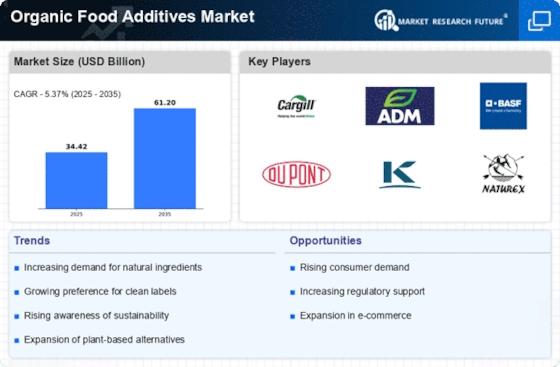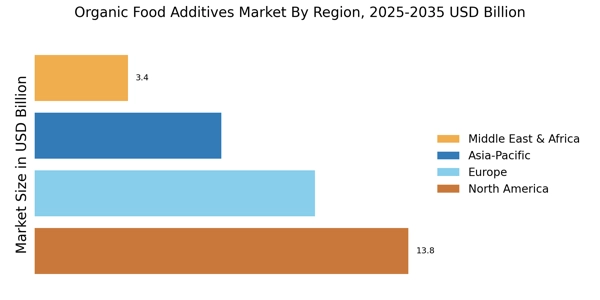Consumer Awareness and Education
The Organic food additives Market is significantly influenced by heightened consumer awareness and education regarding food ingredients. As consumers become more informed about the benefits of organic additives, they are more inclined to choose products that contain these ingredients. Educational campaigns and information dissemination through various media channels have played a pivotal role in shaping consumer perceptions. This increased awareness is reflected in market data, which shows a steady rise in the sales of organic food products. As consumers seek transparency and quality in their food choices, the demand for organic food additives is expected to grow. This trend indicates that companies in the Organic Food Additives Market must prioritize clear communication about the benefits and sourcing of their organic ingredients.
Health Conscious Consumer Trends
The Organic Food Additives Market is experiencing a notable shift as consumers increasingly prioritize health and wellness. This trend is driven by a growing awareness of the adverse effects of synthetic additives and preservatives. As a result, there is a rising demand for organic alternatives that are perceived as safer and healthier. According to recent data, the organic food sector has seen a compound annual growth rate of approximately 10% over the past few years, indicating a robust market for organic food additives. Consumers are actively seeking products that align with their health goals, which is propelling the growth of the Organic Food Additives Market. This trend suggests that manufacturers may need to innovate continuously to meet the evolving preferences of health-conscious consumers.
Rising Popularity of Plant-Based Diets
The Organic Food Additives Market is witnessing a surge in demand due to the rising popularity of plant-based diets. As more consumers adopt vegetarian and vegan lifestyles, there is a corresponding increase in the need for organic food additives that enhance flavor, texture, and nutritional value. This trend is supported by data indicating that the plant-based food market is projected to grow significantly, with organic additives playing a crucial role in product formulation. The shift towards plant-based eating habits is not merely a fad; it reflects a broader societal change towards sustainable and ethical food choices. Consequently, the Organic Food Additives Market is likely to see sustained growth as manufacturers respond to this demand by developing innovative organic additives tailored for plant-based products.
Regulatory Support for Organic Products
The Organic Food Additives Market benefits from increasing regulatory support aimed at promoting organic farming and production practices. Governments in various regions are implementing policies that encourage the use of organic ingredients in food products. This regulatory framework not only enhances consumer trust but also provides a competitive edge to manufacturers who comply with organic standards. For instance, the introduction of certification programs and labeling requirements has made it easier for consumers to identify organic products. As a result, the Organic Food Additives Market is likely to expand, as more companies seek to align their offerings with these regulations. This supportive environment may lead to increased investment in organic food additives, further driving market growth.
Innovation in Food Processing Technologies
The Organic Food Additives Market is poised for growth due to ongoing innovation in food processing technologies. Advances in extraction, preservation, and formulation techniques are enabling manufacturers to create high-quality organic additives that meet consumer demands for flavor and functionality. These technological advancements not only enhance the quality of organic food additives but also improve their shelf life and stability. As a result, the market is likely to see an influx of new products that cater to diverse consumer preferences. Furthermore, the integration of technology in production processes may lead to cost efficiencies, making organic additives more accessible to a broader audience. This innovation trend suggests a promising future for the Organic Food Additives Market as it adapts to changing consumer needs.

















